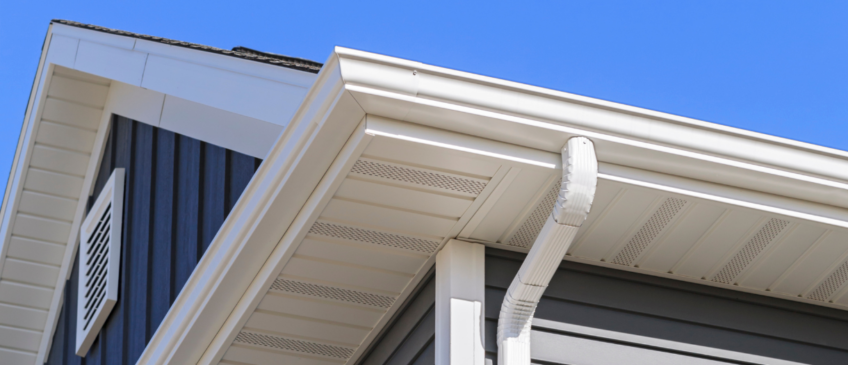Plumbing systems are one of the most critical fixtures when buying a home. We know a compromised plumbing system can lead to pipe erosion, water leaks, and bursting pipes, costing thousands of dollars in repairs. Like plumbing, compromised gutters can lead to thousands of dollars worth of damage to your home. That’s why it’s essential to understand what you need to know before buying gutters.
Gutters are like an external plumbing system, so choosing the style best suited for your house should be just as crucial as ensuring your interior plumbing is intact.
What You Need to Know Before Choosing a Gutter Style
Two main gutter styles are used across the U.S.: K-style gutters and half-round gutters. Let’s look at how these gutter styles vary, including material, size, and advantages.
K-Style Gutters
Advantages
K-style gutters are the most popular choice for homeowners across America. Solid and easy to install, K-style gutters have been around since the 1940s and retain more water than other gutter styles. In addition, K-style gutters are stylish and fit in with most modern home designs today. This is why they are among the most popular gutters across the U.S. These gutters also come with a seamless finish option, reducing the risk of leaks and water damage compared to other gutter styles.
Disadvantages
Due to the K-style shape, these gutters can be more challenging to clean than other gutter systems. With one side flat and the other curved, the corners are hard to reach and hold leftover debris and water. Depending on the material, water in the gutter system can make it susceptible to corrosion, eventually leading to a repair or replacement.
Half-Round Gutters
Advantages
Half-round gutters have a symmetrical U-shape which aesthetically suits older homes. The U-shape creates easy access to ensure the removal of all the debris with the changing seasons. In addition, with a smooth interior, water and waste move more freely to the downspout. Therefore, half-round gutters need less maintenance than other gutter options. This reduces the risk of leaks and overflow, which can lead to gutter corrosion.
Disadvantages
While U-shape gutters are easy to clean, they also easily collect debris. So, even with a smooth interior, this style of gutter typically needs regular maintenance to protect your home.
Gutter Materials: What to Know Before Buying Gutters
Aluminum
Aluminum gutters are the most popular choice, with the main advantage being their ability to resist corrosion. As water continues to sit and flow through your gutter system, this style is rust-resistant, more durable, lightweight, cost-effective, and better suited for the changing seasons.
Vinyl
Like aluminum, vinyl gutters are highly durable and rust-resistant. Vinyl gutters are not the most cost-effective; a ladder should not dent, scrape, or damage the gutter when placed upon it. When purchasing vinyl gutters, be sure to inspect the quality. Some cheaper vinyl products can be more prone to being weighed down by snow and ice. To reduce this risk, look for a thick vinyl product.
Copper
Although copper gutters are beautiful and can add a unique appeal to one’s home, they also are the most expensive. Similar to the other materials, copper is rust-resistant and is also the most durable. If cared for properly, these gutters can last for decades without needing to be replaced or repaired.
What You Need to Know Before Choosing a Gutter Size
The amount of rain, the size, and the slope of your roof are determining factors when choosing a gutter size. That said, five and six-inch gutters are the most common sizes in the United States, while in Canada, eavestroughs can go up to fifteen inches.
When determining the size of the gutter best suited for your home, it is essential to note that six-inch gutters are more costly but can withstand more rain. Six-inch gutters hold almost fifty percent more rain than five-inch gutters. They’re installed with larger downspouts and are less likely to clog.
Why Gutters Are Important
The purpose of gutters is to move water away from your home and its foundation. Without gutters, you risk water sitting on your roof or running down your siding. Unfortunately, some homeowners ignore the signs of common gutter problems, leading to deterioration, rot, mildew, or mold. In addition, when water moves down the siding of a house, it causes erosion and weakening of the foundation, which can lead to basement flooding.
Although gutters can eliminate the threat of water damaging your home, these problems can still occur without proper maintenance. Leaves, twigs, and other debris can clog gutters causing water overflow and leaking, leading to foundation issues.
How LeafFilter Can Help
Not only does LeafFilter install gutters, but we also pride ourselves in being America’s #1 Rated Gutter Protection System*. By allowing one of our local estimators to evaluate what is best for you, we can reduce your stress about what you need to know before buying gutters.
re

